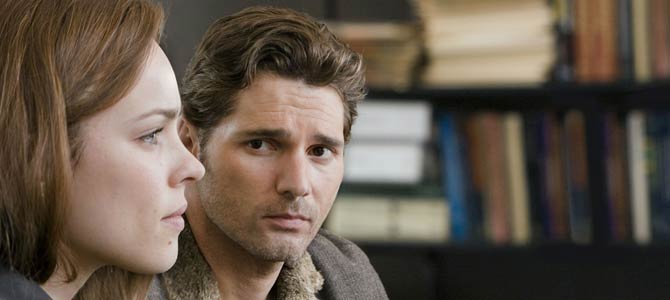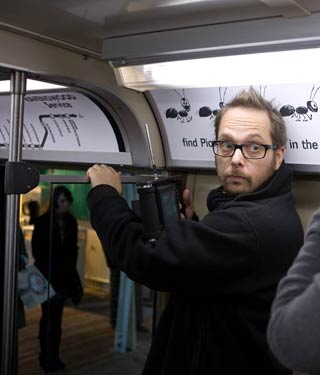Next story: Whose Recovery?
Time & Again
by M. Faust

The writer and director of The Time Traveler's Wife talk about love stories and late starts
At one point in Mike Myers’ The Spy Who Shagged Me, in which Austin Powers is sent back from 1999 to 1969, the marvelously named Basil Exposition (Michael York) answers the superspy’s questions about the logical implausibilities and inconsistencies of time travel with a soothing, “I suggest you don’t worry about those things and just enjoy yourself.” He then turns to face the camera and advises the viewers, “That goes for you all, too.”
You will need to adopt that attitude if you hope to enjoy The Time Traveler’s Wife, the new film based on the best selling novel by Audrey Niffenegger. It still may not be your cup of tea—the science fiction plot line is essentially a gimmick to tell an emotional story about two people in love. But it won’t take you long to realize that, even more so than with other movies about characters who travel through time, the logical inconsistencies and unanswered questions here will need to be ignored.
It’s not entirely correct so say that Henry DeTamble (Eric Bana, looking substantially hunkier than in the current Funny People) is able to travel through time. Rather, travel happens to him, uncontrollably and unpredictably. Like Billy Pilgrim in Kurt Vonnegut’s Slaughterhouse Five, he is “unstuck” in time, randomly (but never permanently) moved to different points in his past or future.
Based on a script adapted by Bruce Joel Rubin, the Oscar-winning writer of Ghost, the film is less concerned than the novel with Henry’s various adventures in the past and future than with the effects of his condition on his relationship with Clare (Rachel McAdams), the woman who becomes his wife.

Blessed with strong chemistry between the film’s stars, a lush musical score by Mychael Danna and the luminous photography of Florian Ballhaus (Michael’s son), The Time Traveler’s Wife is a dreamily resonant and emotionally gripping romantic wallow that seems at odds with the kind of movies Hollywood generally releases in the summer months.
As a viewer who surrendered to it, I had to disagree with scripter Rubin when, addressing the male members of a room of journalists in a Manhattan hotel a few weeks ago, he said, “I suspect you guys are all going to beat us up in the press, because most guys are not going to love this movie.”
Adamant that movies should be experienced not from the viewer’s head but from the gut and the heart, Rubin admits that it’s unavoidable that viewers are going to spend the first reel of the film trying to analyze its rules as they would any science fiction movie.
Pointing to his heart, he said, “I had to find a way to make this movie come from here and not make it something you’re thinking about all the time. When you have to think about a movie, it takes me out of it for 10 or 20 seconds and that long to get back into the film. And by that point you’ve lost time, and building your trust in the movie again is hard.”
Rubin, whose first script wasn’t produced until he was 40, has always been drawn to the theme of how love is affected by death—along with Ghost (which he is currently adapting into a Broadway musical, with songs by Dave Stewart of Eurythmics), his best known scripts were for Jacob’s Ladder, Brainstorm (Natalie Wood’s final movie), and My Life, which he also directed; his next film is called Into the Light.
So despite its complicated plot, Niffenegger’s book was tailor-made for him, and he fought to get to adapt it. After he put some initial work into it, the project was given to another then-hot writer. But four years later, when director Robert Schwentke (Flightplan) was hired, he brought Rubin back on board.
“I met with Robert and we were on the same page with this movie, we both saw it as a love story,” Rubin said. “I sat down and four weeks later I had a script. And that script was delivered [to me]. It’s the most extraordinary thing that can happen to you in writing and it doesn’t happen often. It happened to me with Jacob’s Ladder, but I just knew from scene to scene what this movie should be. I knew that it was a love story and that even though it played in time, it didn’t matter where I went in time as long as the love story was moving forward. That’s all that mattered. So I don’t take a lot of credit for it. I was lucky that I could listen and that I had years of training listening to stories and how they were told.”
It’s the writer’s curse to have to give up control of his work to someone who will use it as, at best, a blueprint. (Unlike the theater: Of the Ghost musical, he grinned and said, “I love working in a medium where they have to ask you, ‘Can I change this line?’”) Successful writers often parlay any success in that field into directing, so after Rubin won the Oscar for Ghost he accepted an offer to film his own script for My Life, starring the then-hot Michael Keaton and a rising actress named Nicole Kidman.
Eager to get total control over his own vision, he discovered instead that “I was able to destroy my work as well as anybody else.
“When I looked for the first time at the assembly, which contains ever scene you shot, every line of dialogue, you look at it and you want to kill yourself. The minute you see it, it’s like, how could I write something so horrible? It turned out to be an okay movie, but I realized I was a mediocre director. That was a big deal for me. Maybe if I directed 20 movies I might actually be a good director, but because I started late I’m not going to get a chance.”
That’s certainly not true of director Robert Schwentke, a soft-spoken German native who studied at the American Film Institute and who has only made three films prior to The Time Traveler’s Wife, the last of which was the Jodie Foster thriller Flightplan. This is consciously a change of pace from his previous films. Although he didn’t write it, he said, this is a “very personal film for me. When I read the novel, a lot of the things in it resonated with me. I had been looking for a love story very specifically because I wanted to make a film about a stage in my life. I have a family, I’m married, I’m very, very happy, and I wanted to make a movie for my wife. I wanted to make a movie about what it is to be in a very committed, very grounded relationship.”
So did she like the movie? “She hasn’t seen it yet. In the past for every movie I’ve ever made I put her through the wringer. I would show her dailies—my first film I made her sit through every single shot. My second film I showed to her out of sequence, with the ending first. Then with Flightplan I brought home all these different cuts and edits, so that by the time we went to the premiere, she was like [sighing] ‘Fine.’ So because this one is it’s aimed for her, I decided to spare her the pain until she saw it at the premiere. I hope she enjoys it.”
Schwentke agrees with Rubin that paring an essential plotline from a complicated novel is only the first step in making a film of it. “It’s not like you get up in the morning on the first day of shooting and say, ‘I’m so smart today, I’m going to determine every choice I’m going to make from now until a year and a half from now.’ The movie bucks you, it shifts, it doesn’t want to do what you want it to do. It just grows, and then at the end you have a movie.
That said, he doesn’t believe in hedging his bets for the DVD release of the movie. “I don’t do deleted scenes,” he said. “I commit to one version. And that’s it. The movie arrived at a certain form based on insights that were gathered along the way, and it’s okay if there’s just one film out there.”
Watch the trailer for The Time Traveler's Wife
blog comments powered by Disqus
|
Issue Navigation> Issue Index > v8n33 (week of Thursday, August 12, 2009) > Time & Again This Week's Issue • Artvoice Daily • Artvoice TV • Events Calendar • Classifieds |









 Current Issue
Current Issue